- Home
- Julie Smith
P.I. On A Hot Tin Roof Page 3
P.I. On A Hot Tin Roof Read online
Page 3
“No, I’m not telling you that. Will you listen? I was set up.”
Eddie made a sound like pssp. “Yeah, and I got a bridge to sell ya. How bout the Superdome? Get ya a good deal.”
She ignored him, instead straightening up and leaning forward slightly. “You know Buddy Champagne?”
“Yeah, I know Buddy. Good guy.”
“Bad guy.”
Eddie considered. That was possible. He knew Champagne mostly from running into him at the Bon Ton, Ruth’s Chris, Mandina’s, places like that; people he knew knew the judge. That didn’t really mean Eddie did, though they’d exchanged plenty of small talk over the years. “Go on,” he said.
“Well, awhile back, Buddy bought the old Pelican Marina, out at Venetian Isles. You know it?”
“Run-down old place.”
“Yeah. Buddy got it for a song and he decided to turn it into a commercial enterprise, make it pay off for him.”
Eddie nodded. “Nothin’ wrong with that.”
“But the thing is, it’s right in town—right in the middle of the neighborhood, and it isn’t zoned for commercial use.”
“I’m listenin’.”
“Think that bothered Buddy? Oh, no. Buddy’s a judge, see? He’s above the law. Buddy can do what he damn well pleases—in Buddy’s opinion. But the neighborhood people didn’t see it that way. They tried to stop the development.”
That jarred Eddie’s memory. “It’s comin’ back to me now. The Times-Picayune ran a little piece about it. Sounded like a technicality or somethin’—like some guy with a grudge against Buddy tryin’ to harass him.”
“It was a pretty biased story. It isn’t just one guy. It’s a real grass roots movement. Champagne’s doing seafood processing out there. You know how that smells when the wind’s right?”
“You gettin’ to the point any time soon?”
“I’m the lawyer for the neighborhood group.”
Eddie thought about it a minute before the penny dropped. “Let me get this straight. You sayin’ a judge planted drugs on ya—you and ya well-known druggie client—to scare you off the case?”
“Actually, I don’t think scaring was exactly the point—I think he meant to permanently disable me.”
“What makes ya think that, Angie? Ya had a run-in with him in court or somethin’?”
“Several, as a matter of fact. But who hasn’t? It’s not that, Dad. He’s done it before—to Ben Izaguirre, the head of the group I represent. Only Ben saw Buddy’s thugs messing with his car, and got there before they could get his bought cops to bust him. Found the stuff and threw it in the lake. Not five minutes later, two cops showed up with some kind of bullshit violation and searched his car.”
“Uh-huh. How did he know Champagne was behind it?”
“The guy who planted the drugs works at the marina.”
“Don’t mean nothin’.”
“It might not. But Ben got a couple of warning phone calls first—telling him to back off or else.”
Eddie chewed his lip. “Okay, okay, I see what ya gettin’ at. Did you get a warning call?”
“Uh-uh. Ben called the judge afterward and got tough with him. Buddy denied it, of course, but I guess he figured out it didn’t take a genius to connect a back-off call with a little back-off action. So with me, he played hardball.” She stopped and sighed. “And Alabama’s paying for it.”
Eddie was getting her drift; the more she talked, the more plausible it seemed. Now he thought about it, he’d heard rumblings about Champagne; but then you heard stuff about everybody. He hadn’t paid a lot of attention. “Swear to me on ya mother,” he said, “that there’s no way ya client coulda had the drugs.”
“Dad, I swear to you. The drugs weren’t even in his stuff. The pot was on the front seat, and he hadn’t even been in the car yet. The rock was way in the back of my trunk. Somebody had tucked it away in a real safe place. Very tenderly and lovingly.”
Eddie set down his beer with a thunk. “That bastard—’scuse my French—mess with my little girl, I swear to God—”
“Dad, cut it out. I’m not a little girl.” She paused and gave him what from her was a beseeching look, though you’d have to be a close relative to pick it up. “But I do need your help.”
For the first time in a long while—an unnaturally long while—Ms. Wallis spoke. “Ange. What did you mean when you said it was getting worse? And what in hell was that about my contacts? I don’t have any contacts.”
“You have one. Evan Farley called from the Times-Picayune this afternoon. He’s the one who wrote that unfair story about the marina. Champagne’s got him in his pocket.”
“Called about what?” Eddie asked.
“He knew Al and I got arrested.”
“And he’s going to run a story about it?”
“Unless we can nip it in the bud.”
“Jane Storey!” Ms. Wallis said. Storey was a Times-Picayune reporter and a friend of hers.
Angie nodded. “I thought maybe if we could offer her a better story, they might hold off on this one. I mean, I don’t know how much clout she’s got, but it might be worth a try.”
Eddie was seeing his daughter’s law school education go down the drain. If the story ran, she might never recover from it—no one would remember she was never convicted of the crime; all they’d remember was that she’d been involved in something shady. He absolutely couldn’t let that happen to her.
“I don’t care for myself, but Alabama’s a public figure. He doesn’t deserve this, y’all. I got him into this. The one person he trusted.”
“Ya better start carin’ for yourself,” Eddie muttered. His mind was whirling. “Look, if Buddy planted the drugs, he’s dirty.”
“Yeah. And you guys are detectives, right?”
“Angie, Angie. Hold it. How we gonna prove somethin’ like that?”
“Ben says he’s into other stuff.”
“What other stuff?”
Angie leaned back, deflated. “I don’t know. We need time.” She looked at Talba, her eyes pleading—or as close to pleading as they got.
Ms. Wallis was nodding. “Could be done. I’ve got an idea.”
“God help us,” Eddie said automatically.
“Look, I’ll do one of my undercover acts.”
Ms. Wallis had two other talents besides being a pretty decent fledgling P.I.—she was an accomplished poet and a computer virtuoso. Anything that needed doing, she could do, so long as it involved the infernal machines. She was self-taught, but she could play the computer like a Stradivarius. It made her an invaluable little corporate spy. Somebody needed a nerd, she could get the job; and while she was in the office, nobody had any secrets. Eddie’d never say it to her face, but he was in awe of what she could do. True, he had doubts about her methods, but she swore to him she never did anything illegal.
“This ain’t no fancy law office, Ms. Wallis. Ya think ya gonna worm ya way into his chambers, go through his files? Besides, he ain’ gon’ have anything on paper.”
“I’m not going into the courthouse, Eddie. I’m going into his house—as a maid.”
There were those who said Eddie was a bit of a racist and even more of a sexist—Audrey and Angela, for two—but this didn’t sit right with him. No way was he going to send his associate in as a maid. Uh-uh. He said it aloud: “No way. José.”
Even Angie looked at her in horror.
“Yep. I’m gonna do it. And y’all can’t stop me. If he’s dirty, it’ll come out—on the telephone, maybe. Or somebody’ll come to the house for payoffs. He’ll feel safe at home; that’s where he’ll be careless. Y’all have probably heard that no one ever notices the help? Miz Clara knows the damnedest things about people. It’s like she’s invisible. I’m just going to put on my invisible suit and go in there and come out with some dirt.”
“Ya not plantin’ anything on him.”
“Eddie, don’t be ridiculous. Give me two weeks; I’ll do it. Two weeks’ leave if you wan
t to play it that way, because I’m doing it. My mind’s made up.”
Eddie sighed. Those were the four words she’d never go back on. He could fire her and she’d still do it. What the hell? he thought. The worst she can do is plant bugs and get thrown in jail and get me sued and fined ten thousand dollars. The thought gave him a stomachache. And yet, when all was said and done, he’d rather go down than see Angie burned at the stake in the Times-Picayune. But, come to think of it, that wasn’t the only news organization in town. “What about television? How ya gonna stop those guys?”
“I told you,” his daughter said. “Farley’s in Champagne’s pocket. You can bet he’s got an exclusive. I mean, anyone could find the arrest records, but they’d have to know they were supposed to look for them. Somebody tipped Farley. It’s the only way he could know—and whoever tipped him planted the drugs.”
Wheels were turning again. “Okay, I’ll work that part of it. If Farley’s in Champagne’s pocket, it’s got to have something to do with a case; I’ll find the damn case. Could be pending, or maybe this is payback. Or maybe Farley’s a relative. It wouldn’t be a bribe—if ya gon’ be a reporter, it ain’t bucks you’re after.”
“And if it is a bribe, I might be able to pick it up over at the house,” Ms. Wallis said.
“What makes ya think they need a maid?”
“Don’t you worry your pretty head,” his associate said.
“Here’s the question,” said his daughter. “Do you know Jane Storey well enough to call her on a Sunday night?”
“Watch me,” Ms. Wallis said, and plucked her cell phone from her purse.
Chapter 3
“Jane, I’ve got a great story for you.”
“Well, if it isn’t the Baroness de Pontalba.” The reporter used her nom de plume. “Hello, Your Grace. What, if I may get to the point, is up? For once I’m not alone on Sunday night.”
“Off the record?”
“Sure, off the record. I’m at home, in case you haven’t noticed.”
“You know Angela Valentino, right?”
“Your boss’s kid. Sure. Aka the meanest white bitch in Orleans Parish. That isn’t racist, is it?”
“I’m gonna let it slide. Did you know she was arrested yesterday?”
“No. For what?”
“Drugs.”
“Now that’s a story.” For the first time, she heard enthusiasm in the reporter’s voice. Angie was a pretty prominent lawyer.
“And not just Angie. She was with Alabama Brazil at the time. They both got popped.”
“I’m missing something here. Why are you tipping me? You ought to be on their side.”
“’Cause somebody else already has that story—Evan Farley.”
“Oh, shit. Funky Farley.”
“What? He smells?”
“Damn right. Only not in a literal sense. Something’s really wrong about that guy.”
“Are you the only one who thinks so?”
“Let’s just say he’s not real well thought of at the paper.”
Talba began to relax a little. “Okay, here’s the gist. An extremely prominent citizen set Angie up. Alabama just got caught in the crossfire. That same prominent citizen then proceeded to tip Farley, and the story’s going to run tomorrow. Could you get it stopped?”
“Hell, no. Not unless it’s not true. And you just told me it is.”
“Maybe we could make a trade. I could offer you a much better story on the prominent citizen.”
“Who is?”
“A judge.”
Talba sensed tension at the other end.
“Buddy Champagne,” the reporter said.
“You were pretty quick with that one.”
“Baroness, tell me the truth. Have you really got something on Buddy Champagne?”
“Swear to God,” she lied. “Why?”
“He’s one of those guys everyone thinks is dirty, but nobody can get anything on.”
“How about the marina?”
“Yeah. That’s the thing: Someone from the Venetian Isles neighborhood group called a press conference, which some kid reporter got sent to, and Funky Farley asked to follow up on it. Said the kid’s story was under-reported, almost got him fired. But then the spin Farley put on it, sounded like somebody was persecuting poor old Buddy and all his vendors. David doesn’t trust him.” David Bacardi, she meant, the city editor. Jane had once confided to Talba that she’d had an affair with him. It was long over, but it had come out of a professional closeness that was still bound to be there. She had the feeling Bacardi trusted Jane.
“Look, can you talk to David? Get him to hold the story just one day. Then tomorrow we’ll meet and talk. If you think I’ve got nothing, Farley’s still got an exclusive. I’m pretty sure nobody else knows about this.”
“But you’re not positive.”
“I’m not, but why not ask Farley? If he’s got it exclusively, he’ll know.”
“Let me get back to you.”
“Two things—whatever you do, don’t tell David who your source is.”
“Goes without saying. Number two?”
“Can you bring me Farley’s story on the marina?”
“Consider it done.” The reporter hung up.
It was half an hour before she called back. “David won’t do it. He says no big deal—we run the story and we still get yours when it breaks.”
“Jane, I love you, but there’s nothing in that for me. Doesn’t the word ‘exclusive’ mean anything to ol’ David? Because I swear to God, if you run Farley’s, I’ll take mine right to your favorite TV reporter and leave you eating her dust.”
“Fay Warren. You wouldn’t.”
“Would.”
“That’s what I told him you’d say.” Jane sighed. “Okay, I’ll try again.”
This time she called back in ten minutes. “Okay, it’s done. He just had to try. You know men. Want to meet for lunch?”
“Sure. How about Elizabeth’s? Noon tomorrow.”
“TBK, as we say in the news biz.” To be continued—Jane had taught her the phrase. Talba hung up, wondering where on earth Venetian Isles was. She would have asked Angie if Eddie hadn’t been there, but she wasn’t about to let him know she didn’t know.
Later that evening, she tried to find it on a map, and couldn’t. The Internet wasn’t much help, either, but she did glean that it was somewhere in Orleans Parish, and obviously it was on the water. But where?
Talba scoured the paper first thing in the morning, and to her relief, there was no mention of either Angie or Alabama. Their initial hearings were set for that morning, and she waited tensely till Angie called to say that no reporters except Farley had shown up in court. He hadn’t tried to talk to her. Following up, Talba gathered.
“The good news is, I got Jimmy Houlihan down there for us, and he got the DA to dismiss the charge against Al.”
“Angie, that’s fantastic.”
“It was a bad arrest; no way they were going to make it stick.” She paused and added glumly, “’Cause it was my car.”
Talba barely knew what to say. Angie down was a new Angie. She settled for, “Hang in there, Ange. I’m seeing Jane for lunch. To plot strategy.”
Elizabeth’s, tucked away in the Bywater, had the feel of an airy, informal Caribbean cafe. The menu tended toward soul food (though a white family ran it) and it drew a savvy salt-and-pepper crowd—an altogether appropriate venue, and far from Jane’s office, which meant they had little chance of being overheard. The reporter was already waiting when Talba arrived.
“Everything cool?” she asked anxiously.
“Farley went to Angie’s arraignment.”
Jane shrugged. “Par for the course. We’ll be okay if we can interest David.”
Talba ran the story by her, Jane listening silently till Talba got to the part about the drugs being planted on Ben Izaguirre.
“Farley never had that.”
“It was never public.”
“Wou
ld Izaguirre tell me the story—I mean, not for the record, just to confirm there’s something there? That might do it for David.”
Talba nodded. “Did it for me. This catfish is unbelievable. I’ll get Angie to talk to him.”
“Umm.” Jane was having a salad. “So, okay, the story’s about the drug plants, right? Anything else?”
Talba raised an eyebrow. “One can only hope.” She outlined what she proposed to do.
“Girl! You’ve got guts—wish I’d thought of it.” She wrestled lettuce. “It’s a great idea, but how in hell do you plan to get the job?”
Talba smiled. “I’ve got a connection.”
“Oh, really.”
“Uh-huh.” She was lying through her teeth. “Can I have two weeks? That’s how long Eddie’s giving me.”
“I think David’ll go for it.”
“By the way, why do you think Farley’s giving Champagne so much good ink?”
“No idea.”
“Well, here’s something I’m wondering: Did anybody else cover that press conference?”
Jane thought about it. “I think so—but you know how that is; thirty seconds on television, people forget. Then along came Farley’s story and changed the spin. Pretty clever what he did.”
And before they parted, she handed a copy of the story over to Talba.
It was a piece about shrimp, mostly—cheap foreign imports versus the more expensive local product (“Louisiana wild-caught shrimp”), a hot topic in certain circles. The state’s shrimpers were suffering from the competition, and there were all kinds of pending plans to levy a stiff tariff on the imports. Meanwhile, restaurants were scarfing up the inferior alien product and serving it to unsuspecting patrons. Ben Izaguirre owned a restaurant, but if Farley had questioned him as to which kind of shrimp he served, he hadn’t included the answer in his story. Judge Francis (“Buddy”) Champagne, who bought his product from local shrimpers, then processed it and sold it to restaurants, was portrayed as a friend to his fellow Louisianans, Ben Izaguirre as their enemy.
Pretty thin, Talba thought, unless Izaguirre also imported shrimp. But if he did, why hadn’t Farley had that?
She called Angie and asked her about her client. “Hell, no,” she said. “He’s dying in the restaurant business, and he’s over sixty. He’s trying to sell the restaurant right now. Trust me, this guy is no wheeler-dealer. His only interest is in keeping the neighborhood nice for his retirement. Thanks to Farley, half his old friends hate him now.”

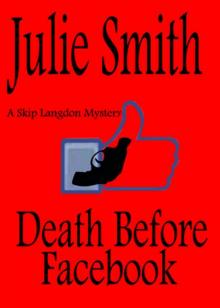 Death Before Facebook (Skip Langdon #4) (Skip Langdon Mystery) (The Skip Langdon Series)
Death Before Facebook (Skip Langdon #4) (Skip Langdon Mystery) (The Skip Langdon Series) P.I. On A Hot Tin Roof
P.I. On A Hot Tin Roof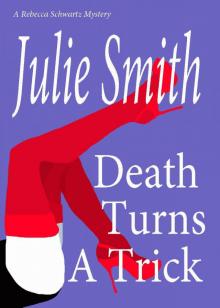 Death Turns A Trick (Rebecca Schwartz #1) (A Rebecca Schwartz Mystery) (The Rebecca Schwartz Series)
Death Turns A Trick (Rebecca Schwartz #1) (A Rebecca Schwartz Mystery) (The Rebecca Schwartz Series) The Axeman's Jazz (Skip Langdon Mystery Series #2) (The Skip Langdon Series)
The Axeman's Jazz (Skip Langdon Mystery Series #2) (The Skip Langdon Series) The Kindness of Strangers (Skip Langdon Mystery #6) (The Skip Langdon Series)
The Kindness of Strangers (Skip Langdon Mystery #6) (The Skip Langdon Series) Louisiana Hotshot
Louisiana Hotshot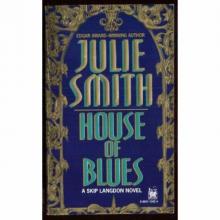 House of Blues
House of Blues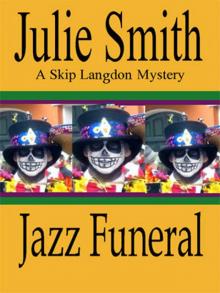 Jazz Funeral (Skip Langdon #3) (Skip Langdon Mystery) (The Skip Langdon Series)
Jazz Funeral (Skip Langdon #3) (Skip Langdon Mystery) (The Skip Langdon Series) Tourist Trap (Rebecca Schwartz #3) (A Rebecca Schwartz Mystery) (The Rebecca Schwartz Series)
Tourist Trap (Rebecca Schwartz #3) (A Rebecca Schwartz Mystery) (The Rebecca Schwartz Series)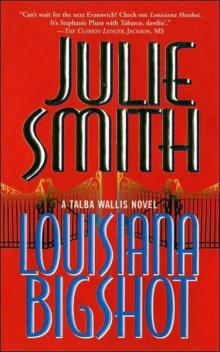 Louisiana Bigshot
Louisiana Bigshot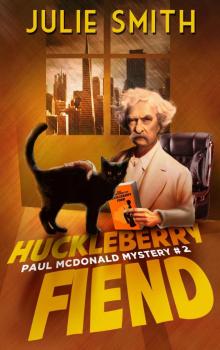 Huckleberry Fiend
Huckleberry Fiend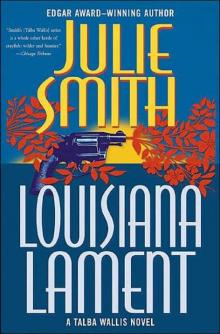 Louisiana Lament
Louisiana Lament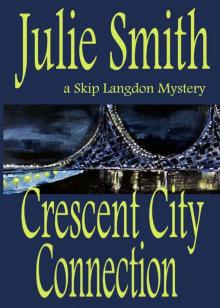 Crescent City Connection (Skip Langdon Mystery #7) (The Skip Langdon Series)
Crescent City Connection (Skip Langdon Mystery #7) (The Skip Langdon Series)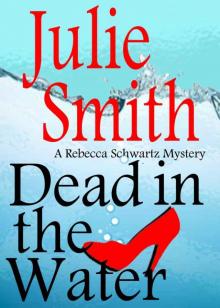 Dead In The Water (Rebecca Schwartz Mystery #4) (The Rebecca Schwartz Series)
Dead In The Water (Rebecca Schwartz Mystery #4) (The Rebecca Schwartz Series) True-Life Adventure
True-Life Adventure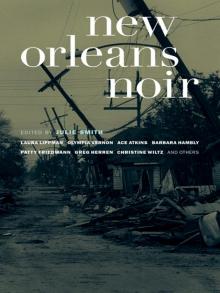 New Orleans Noir
New Orleans Noir